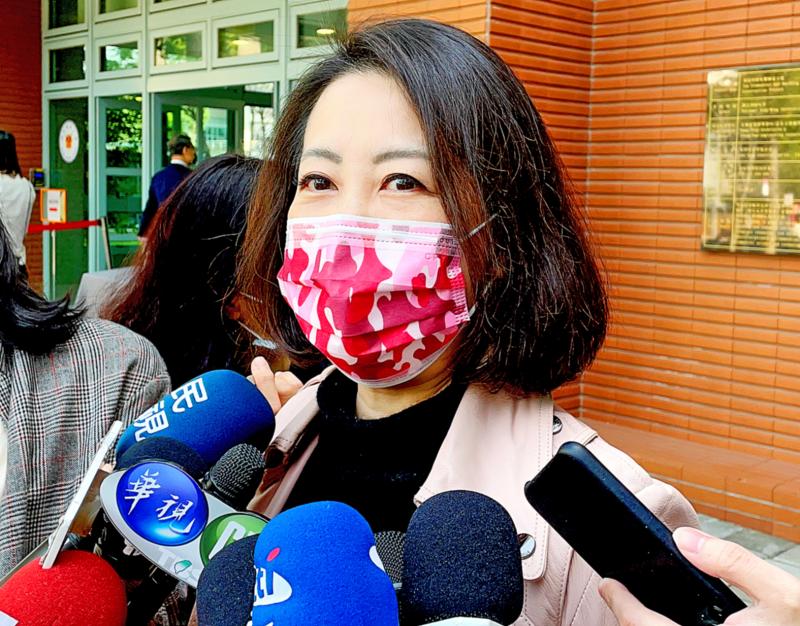Chinese Nationalist Party (KMT) Taipei City Councilor Lo Chih-chiang (羅智強) yesterday apologized for calling Democratic Progressive Party (DPP) Legislator Rosalia Wu (吳思瑤) “ractopamine pork auntie,” while KMT Culture and Communications Committee director-general Alicia Wang (王育敏) urged the public not to judge politicians based on age or appearance.
“There is no need for people to judge politicians based on age or physical appearance, or to use discriminatory words,” Wang told the launch ceremony of a KMT shop on the e-commerce platform PChome.
“The DPP claims to be a progressive party. Its young members should not use discriminatory language,” Wang said.

Photo: Chu Pei-hsiung, Taipei Times
She said she hoped that the DPP could learn from the incident on Monday, when DPP online community center director Fan Kang-hao (范綱皓) called her on Facebook the “already 50-year-old Alicia Wang.”
President Tsai Ing-wen (蔡英文), as a female politician and chairperson of the DPP, should share her opinion on the issue and instruct DPP members not to discriminate, Wang said.
Fan posted images of Wang and DPP Legislator Lai Pin-yu (賴品妤), with captions for both photographs reading: “Young person.”
Under the image of Wang, the caption was crossed out and “Auntie?” had been added, leading to accusations of age-based discrimination against Fan by KMT members.
Fan removed the post on the same day and apologized.
KMT Youth Department director Chen Kuan-an (陳冠安), who heads the KMT e-commerce center, said that the center’s telephone lines have since the incident been jammed with people seeking to purchase recently launched jackets, to express their support for the party and Wang.
“If Rosalia Wu minds the title ‘auntie,’ I am willing to apologize,” Lo wrote on Facebook with the hashtag: “I called Rosalia Wu auntie. I apologize.”
Lo, who is also director of the KMT’s Institute of Revolutionary Practice, asked if Wu would apologize for calling former KMT legislator Ting Shou-chung (丁守中) “Grandpa Ting,” or for calling him chihan (癡漢, foolish person), accusing the DPP of double standards.

Taiwan is stepping up plans to create self-sufficient supply chains for combat drones and increase foreign orders from the US to counter China’s numerical superiority, a defense official said on Saturday. Commenting on condition of anonymity, the official said the nation’s armed forces are in agreement with US Admiral Samuel Paparo’s assessment that Taiwan’s military must be prepared to turn the nation’s waters into a “hellscape” for the Chinese People’s Liberation Army (PLA). Paparo, the commander of the US Indo-Pacific Command, reiterated the concept during a Congressional hearing in Washington on Wednesday. He first coined the term in a security conference last

Prosecutors today declined to say who was questioned regarding alleged forgery on petitions to recall Democratic Progressive Party (DPP) legislators, after Chinese-language media earlier reported that members of the Chinese Nationalist Party (KMT) Youth League were brought in for questioning. The Ministry of Justice Investigation Bureau confirmed that two people had been questioned, but did not disclose any further information about the ongoing investigation. KMT Youth League members Lee Hsiao-liang (李孝亮) and Liu Szu-yin (劉思吟) — who are leading the effort to recall DPP caucus chief executive Rosalia Wu (吳思瑤) and Legislator Wu Pei-yi (吳沛憶) — both posted on Facebook saying: “I

The Ministry of Economic Affairs has fined Taobao NT$1.2 million (US$36,912) for advertisements that exceed its approved business scope, requiring the Chinese e-commerce platform to make corrections in the first half of this year or its license may be revoked. Lawmakers have called for stricter enforcement of Chinese e-commerce platforms and measures to prevent China from laundering its goods through Taiwan in response to US President Donald Trump’s heavy tariffs on China. The Legislative Yuan’s Finance Committee met today to discuss policies to prevent China from dumping goods in Taiwan, inviting government agencies to report. Democratic Progressive Party Legislator Kuo Kuo-wen (郭國文) said

The Ministry of Economic Affairs has fined Taobao NT$1.2 million (US$36,900) for advertisements that exceeded its approved business scope and ordered the Chinese e-commerce platform to make corrections in the first half of this year or its license would be revoked. Lawmakers have called for stricter supervision of Chinese e-commerce platforms and more stringent measures to prevent China from laundering its goods through Taiwan as US President Donald Trump’s administration cracks down on origin laundering. The legislature’s Finance Committee yesterday met to discuss policies to prevent China from dumping goods in Taiwan, inviting government agencies to report on the matter. Democratic Progressive Party